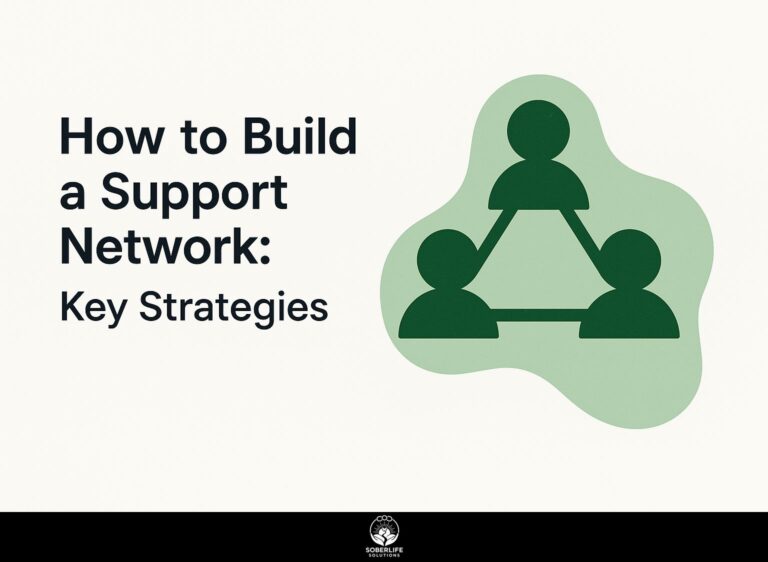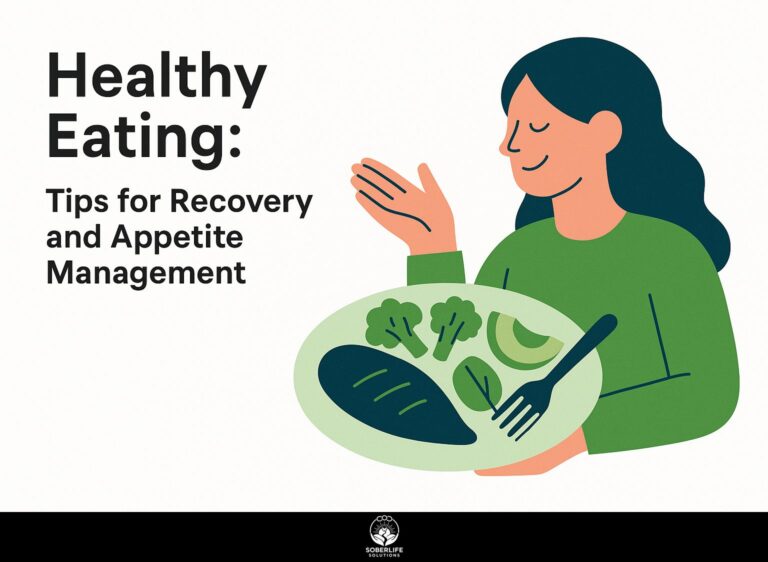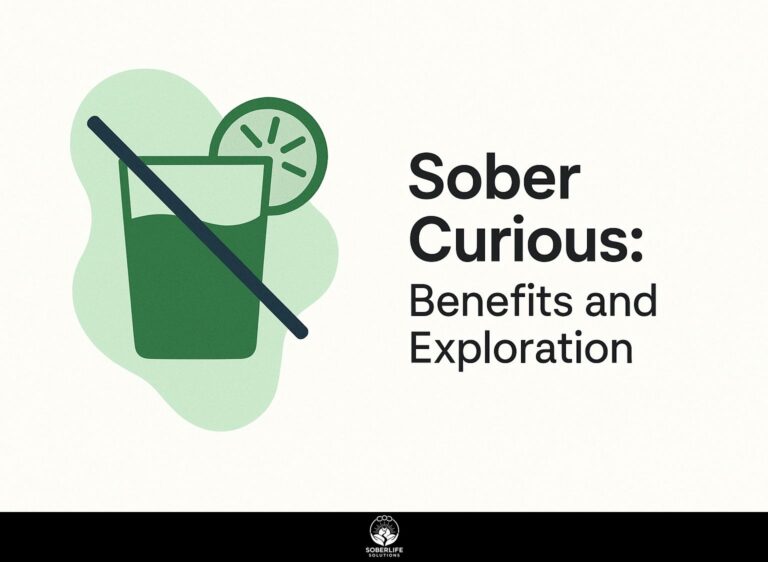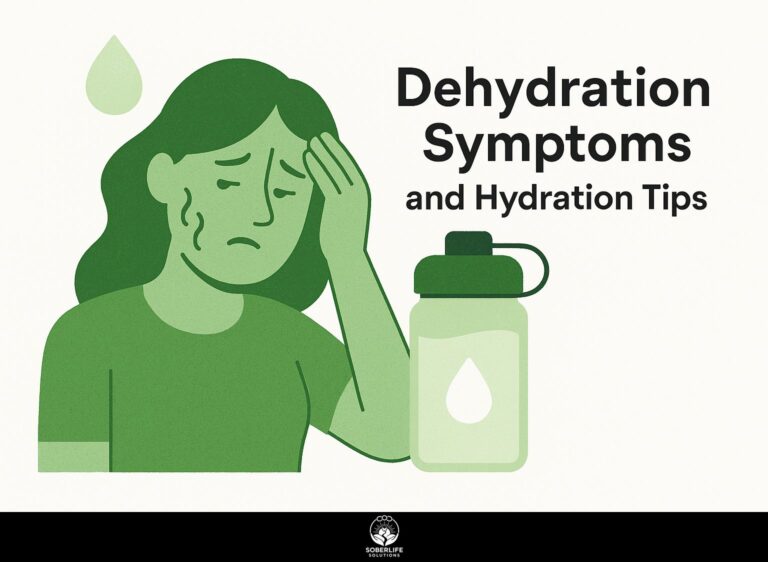Balanced Diet: Benefits and Nutrition for Alcoholism Recovery
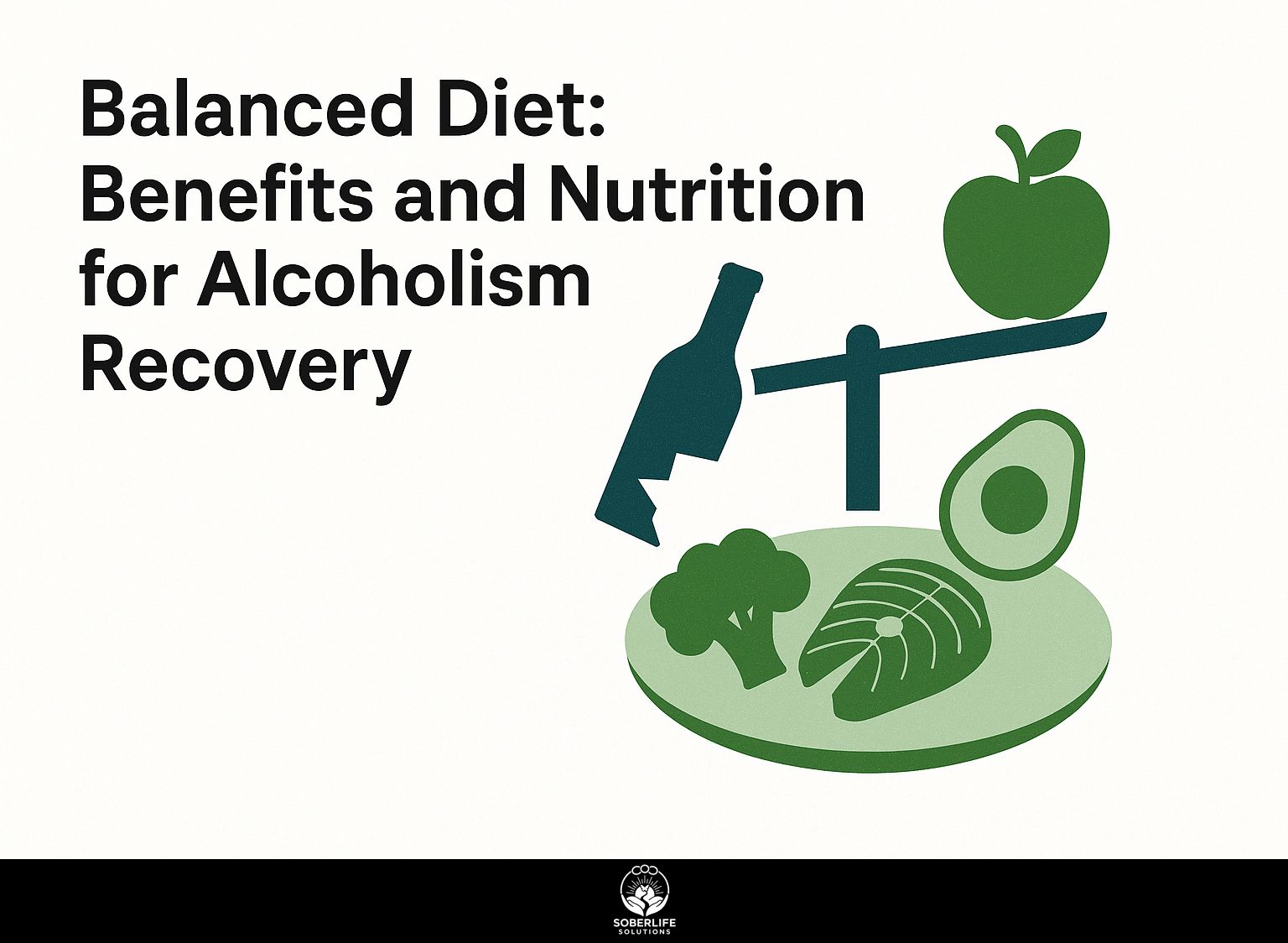
Overcoming alcohol abuse takes more than just determination; it needs a diet full of important nutrients. Proper nutrition plays a critical role in substance use recovery, supporting physical and mental health. By concentrating on consuming enough protein and a range of healthy foods, people can improve their nutrition recovery. This article looks at how eating healthy can help you beat alcoholism and improve your overall well-being.
Key Takeaways:
Understanding Alcoholism
Alcoholism, characterized by compulsive drinking and dependence, significantly affects both individual and societal health.
Withdrawal symptoms can be mild or very strong, and may include anxiety, tremors, sweating, and nausea.
Long-term effects of alcoholism often manifest as liver disease, cardiovascular problems, and cognitive impairments. According to the NHS, these risks are serious and require immediate attention.
People dealing with addiction should get help from places like Recovery Village Columbus, where they provide a plan that fits each person’s specific recovery needs. Their services include:
- Detoxification
- Counseling
- Ongoing support
Offering thorough help for people and families.
Engaging with these resources can lead to sustainable recovery and improved quality of life.
The Role of Nutrition in Recovery
Good nutrition is important for recovering from alcoholism because it supports physical health and mental well-being.
Key nutrients aid recovery significantly. For example, vitamin B1 (thiamine) is important for improving brain health, which is often affected by alcohol addiction. Eating foods high in B1, like whole grains and beans, can improve brain function.
Omega-3 fatty acids found in fatty fish like salmon can help improve mood and reduce anxiety. It’s beneficial to include a variety of fruits, vegetables, and lean proteins to support overall health and energy levels, ensuring your body heals effectively during recovery. A recent publication by the American Society for Nutrition highlights how improving your diet can significantly boost mental well-being, which is crucial during the recovery process. For more specific guidance on nutritional choices during recovery, consider exploring [nutrition tips for addiction recovery](https://soberlifesolutions.com/nutrition-tips-for-addiction-recovery/).
Components of a Balanced Diet
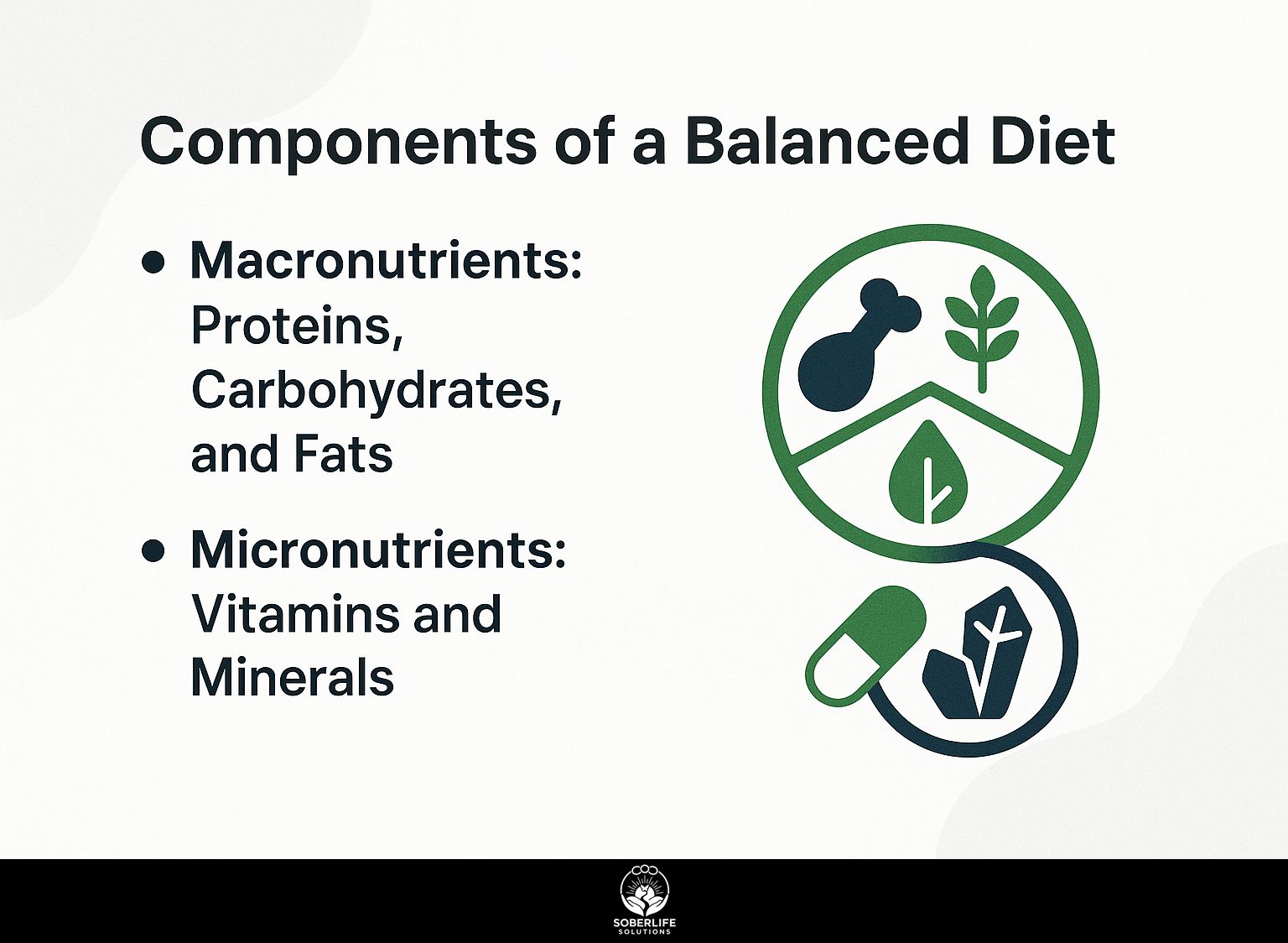
Eating a well-rounded diet is essential for getting better. It should include both large and small nutrients that support the body and mind.
Macronutrients: Proteins, Carbohydrates, and Fats
Macronutrients-proteins, carbohydrates, and fats-are essential for rebuilding body tissues and supporting recovery.
Proteins, present in foods like chicken, beans, and Greek yogurt, are essential for fixing muscles and creating chemicals that transmit signals in the brain.
Foods like quinoa and sweet potatoes are high in complex carbohydrates, which give a consistent energy source, important when recovering.
Healthy fats, sourced from avocados, nuts, and olive oil, support brain health and hormone production.
For optimal recovery, aim for a balanced meal that includes all three macronutrients-consider grilled chicken with sweet potato and avocado for a nutrient-rich option.
This combination will maximize your body’s healing and energy replenishment.
Micronutrients: Vitamins and Minerals
Micronutrients, including vitamins and minerals, are critical in preventing deficiencies common in individuals recovering from alcoholism.
Key micronutrients include:
- Vitamin B1 (thiamine), which plays a major role in energy use;
- Calcium, needed for brain and nerve function;
- Magnesium, important for muscle and nerve activities;
- Zinc, which helps the immune system.
To address deficiencies, add foods like whole grains, leafy greens, nuts, and dairy products to your diet.
Supplementation can also be effective, particularly with vitamin B1 and magnesium, as they are often depleted in those with a history of alcohol use. For those interested in a comprehensive overview of vitamin and mineral supplementation, this analysis by Better Health Channel covers what you need to know about supplement routines.
Always talk to a healthcare professional before beginning any supplement routine to make sure it fits your recovery plan and that you are taking the right amount.
Benefits of a Balanced Diet in Recovery
Eating a balanced diet during recovery helps improve both physical and mental health, leading to complete healing. As mentioned, adopting strategies from our guide on switching to a clean diet can significantly enhance your recovery journey.
Physical Health Improvements
Eating a balanced diet improves physical health by increasing energy, keeping nutrients at the right levels, and aiding the body’s natural cleansing functions.
Incorporating whole foods like fruits, vegetables, whole grains, and lean proteins can significantly reduce the risk of hospitalization by up to 30% for chronic conditions.
Eating foods like berries and nuts, which have many antioxidants, can reduce inflammation. Omega-3s in fish benefit heart health.
Tools like MyFitnessPal can track your nutritional intake, ensuring you meet your dietary needs.
The Mediterranean diet, known for its health benefits, emphasizes eating plenty of plant-based foods and healthy fats, contributing to overall physical well-being.
Mental Health Benefits
Eating a well-rounded diet can greatly improve mental well-being, lowering feelings of anxiety and depression, and helping control cravings.
To help improve your mood during recovery, include a mix of fruits and vegetables in your meals.
Start your day with a smoothie that includes spinach, bananas, and berries, which are rich in vitamins and antioxidants. Try to cover half your plate with colorful vegetables at lunch and dinner, like bell peppers and carrots.
Think about eating nuts, such as walnuts and almonds, to improve brain function.
These simple adjustments can lead to noticeable improvements in your overall mood and mental clarity.
Specific Nutritional Needs for Recovering Individuals
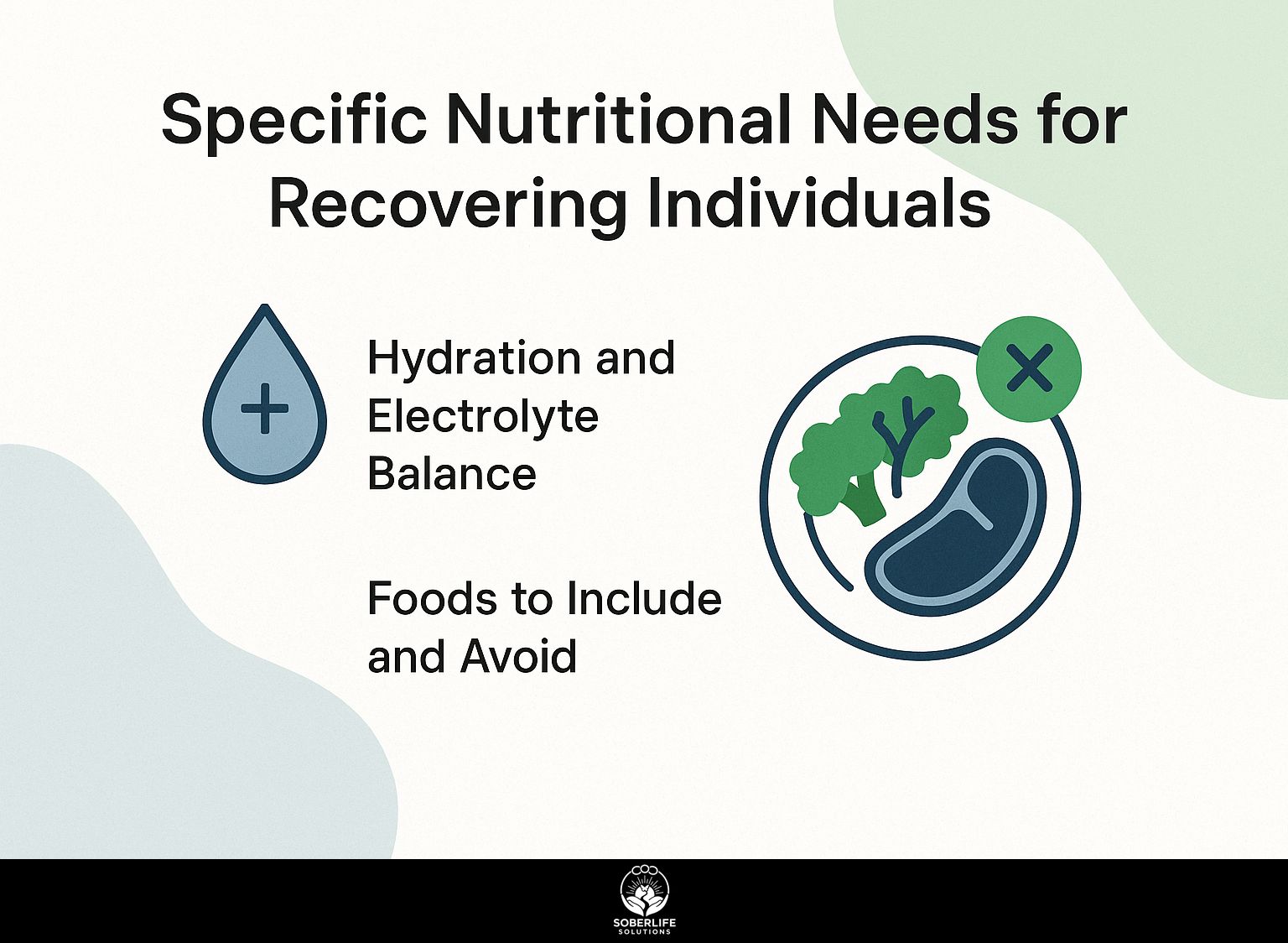
People recovering from health issues have specific dietary requirements to support their physical and mental recovery.
Hydration and Electrolyte Balance
Proper hydration and electrolyte balance are critical during detoxification, supporting bodily functions and mental clarity.
To effectively rehydrate, focus on replenishing fluids and electrolytes. Drink water consistently, aiming for at least 8-10 glasses throughout the day.
Drink drinks with electrolytes, like coconut water or sports drinks, especially those with sodium and potassium, to help restore balance. Monitoring symptoms is also essential; signs of imbalance include dizziness, fatigue, or muscle cramps.
If you notice these symptoms, eat more bananas or leafy greens to raise potassium levels, and think about using a mild electrolyte supplement if needed. These changes can greatly improve recovery and general health.
Foods to Include and Avoid
It’s important to know which foods to eat or avoid to stay healthy during recovery.
Eating foods rich in nutrients can greatly improve recovery. Focus on lean proteins like chicken and fish to aid muscle repair, alongside whole grains such as quinoa and brown rice for sustained energy.
Fruits like berries and bananas provide antioxidants and essential vitamins, while vegetables offer fiber and a range of nutrients. Conversely, avoid processed foods laden with sugars and unhealthy fats, as they can lead to inflammation and impede recovery progress.
By choosing your food carefully, you help your body heal better.
Creating a Sustainable Meal Plan
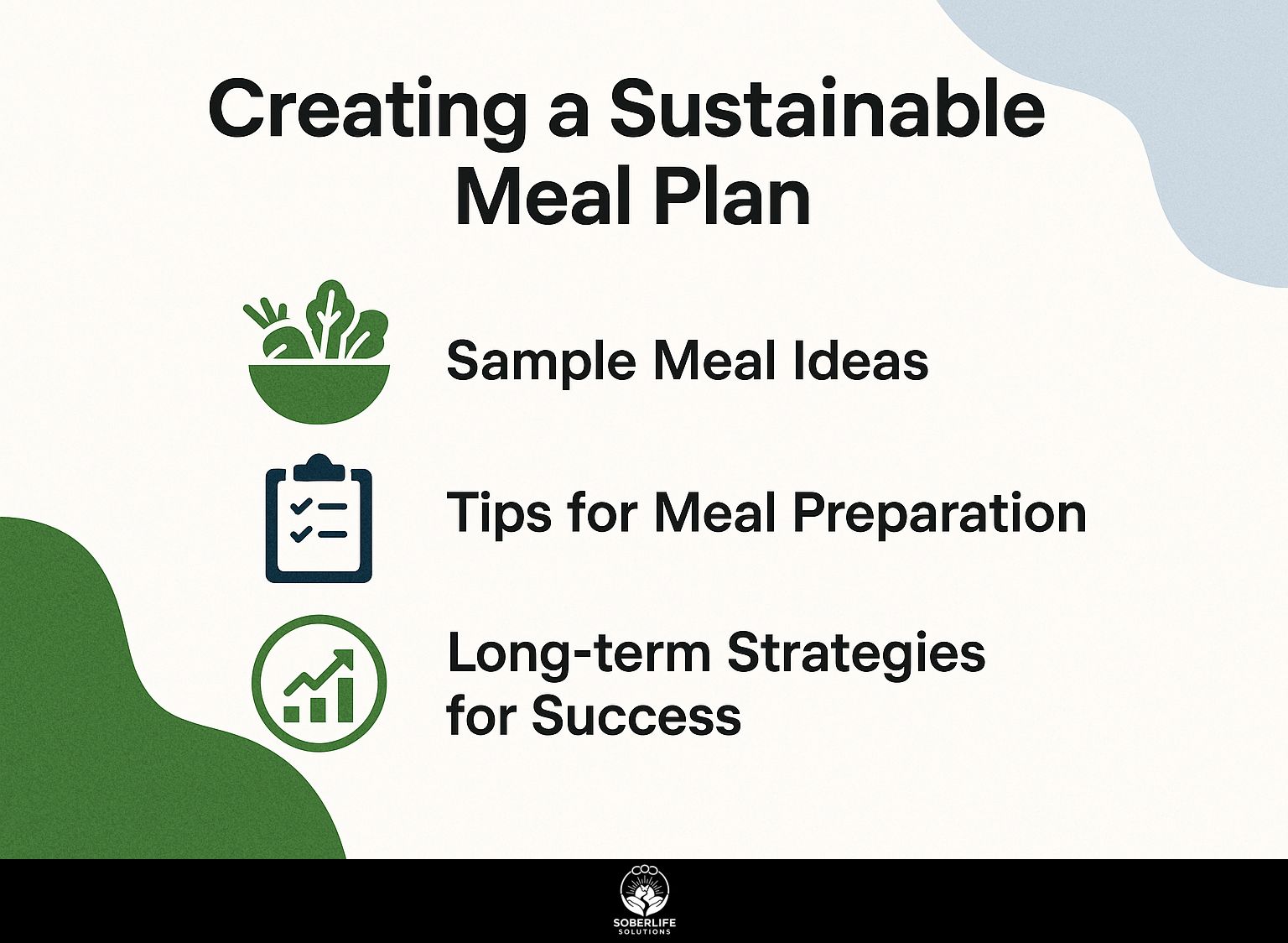
A sustainable meal plan is important for keeping a healthy diet while recovering, supporting long-term success. For effective strategies, you might find these nutrition tips for addiction recovery very helpful.
Sample Meal Ideas
Including different meals is important to keep recovery diets interesting and nutritious.
Consider these sample meals that offer balanced macronutrients and essential micronutrients.
- A quinoa salad with chickpeas and mixed veggies provides protein and fiber, beneficial for muscle repair.
- Grilled salmon paired with sweet potatoes and asparagus offers omega-3 fatty acids and vitamins A and C, promoting overall health.
- A stir-fry with tofu, broccoli, and brown rice provides enough protein and fiber and helps with digestion.
- A smoothie made with spinach, banana, and Greek yogurt can deliver calcium, potassium, and antioxidants.
These meals help you recover and taste good too.
Tips for Meal Preparation
Effective meal preparation can simplify healthy eating, ensuring regular meals that support recovery goals.
To begin meal prepping, start by planning your weekly meals each Sunday. Opt for batch cooking staples such as quinoa, roasted vegetables, and grilled chicken, which can serve as the base for various dishes throughout the week.
Invest in sturdy containers that are freezer-friendly and easy to stack, facilitating organized storage. Make a shopping list that includes fresh foods to skip processed ones, so you have all essentials ready.
By executing this routine, you’ll save time while enjoying nutritious and delicious meals.
Long-term Strategies for Success
Implementing long-term strategies is essential for sustaining recovery and achieving health goals.
- Start by setting realistic, measurable goals, like incorporating at least five servings of fruits and vegetables daily.
- Use apps like MyFitnessPal to monitor what you eat and learn about your eating habits.
- Find help by joining a local or online group that focuses on healthy eating. These groups can offer motivation and keep you on track.
- Regularly check how you’re doing and change your goals if needed to keep them realistic and motivating.
This method helps build strength and a lasting connection with food, supporting the progress of your recovery.
Frequently Asked Questions
What is a balanced diet and why is it important for alcoholism recovery?
A balanced diet is a meal plan that includes a variety of foods from all food groups in appropriate portions. It is important for alcoholism recovery because it provides the body with essential nutrients that may be depleted due to excessive alcohol consumption, and helps improve overall health and well-being.
What are the benefits of following a balanced diet during alcoholism recovery?
Eating a balanced diet while recovering from alcoholism has many benefits, including better physical and mental health, more energy, a better mood and sleep, a lower risk of chronic diseases, and better recovery from alcohol addiction.
What are some key nutrients that should be included in a balanced diet for alcoholism recovery?
Some key nutrients that should be included in a balanced diet for alcoholism recovery are complex carbohydrates, lean protein, healthy fats, vitamins, minerals, and water. These nutrients help replenish the body’s reserves and support recovery from alcohol addiction.
Can a balanced diet help with alcohol cravings during recovery?
Yes, a balanced diet can help with alcohol cravings during recovery. Nutrient-rich foods help stabilize blood sugar levels, promote good gut health, and reduce inflammation in the body, all of which can aid in reducing alcohol cravings and promoting a healthier lifestyle.
Are there any specific foods or supplements that can support alcoholism recovery?
While a balanced diet is the foundation of good nutrition during alcoholism recovery, certain foods and supplements may also be beneficial. These include foods rich in B vitamins, magnesium, and amino acids, as well as supplements like milk thistle, which can help support liver function and detoxification.
How can a nutritionist or dietitian help with creating a balanced diet for alcoholism recovery?
A nutritionist or dietitian can offer individual advice and help in planning a balanced diet for those recovering from alcoholism. They can assess an individual’s nutritional needs, provide meal planning and education, and help develop strategies to maintain a healthy diet during recovery.

